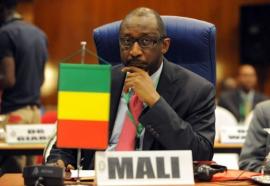CAIRO: On Tuesday, Talaat Rashed Mansour spent his day salvaging what is left of his spare car parts shop that was burnt down during the latest clashes between protesters and security forces.
Located on Mohamed Mahmoud St., the shop was completely destroyed after a tear gas canister hit its emblem before it penetrated the iron gate and set the whole place on fire.
“Even if we receive compensation for loss, this is still unfair; this is our sole source of livelihood,” said Mansour’s 14-year-old son Mina Talaat.
Mina spoke on behalf of his father who was not in a “good mental state” to talk, according to his employees.
“He is in denial,” said Islam Mostafa, 20, who was helping Talaat salvage what was left of his shop.
Residents and business-owners in downtown’s Mohamed Mahmoud, the center of violent clashes with security forces that took place in November and February, say their businesses as well as their personal lives have been put on hold.
The military and interior ministry proceeded to assemble a concrete wall separating security forces and protesters, akin to the ones built during the November and December clashes.
These walls also act as a barrier for residents, blocking their commute to other parts of downtown.
“This was a very lively and commercial street. It’s dead now with only street children roaming and rocks scattered everywhere on the ground,” said Yasser Etman, owner of Etman Bakery located in Mohamed Mahmoud St.
Ten people were killed as fighting raged in the streets surrounding the interior ministry, including Mohamed Mahmoud, Mansour and Noubar streets, following protests against the Port Said football massacre. Five were killed in similar clashes in Suez.
While the minister of interior denies that any birdshots were fired, residents of Mohamed Mahmoud St. said several birdshots landed into their shops and balconies.
“Our life has become very difficult; everyone must understand that there are people living around the ministry. Provoking the police results in them firing teargas which doesn’t only keep us inside our houses but it is also harmful for children and old people,” said a 50-year-old resident who preferred to be only identified as Mohamed.
He added that he neither blames the protesters nor the ministry, but believes that security became an issue in the area.
“These battles provide an opportunity for thieves to abuse the fight to their advantage,” he said.
“We are thinking of moving out; we just can’t continue like this. But we have nowhere to go,” he added.
Most of the shops that were in the middle of the battlefield were looted. Citymall, a computer shop located off Noubar St. was completely ransacked and looted, leaving only empty boxes behind.
Ibrahim Ahmed Moussa sat in front of his pastry shop which he said was raided by thugs during the clashes.
“We don’t expect any compensation from anyone, but we don’t also blame protesters or the police; just the thugs,” he said.
During the clashes, Moussa opened his shop for people to rest during the several truce periods. Protesters would take a break and be offered tea before the police fired another round of teargas.
Many shop-owners sat together on the other side of Mohamed Mahmoud St., agreeing that they don’t expect the state to compensate them or even investigate what happened to their businesses.
“Where is everyone’s conscience? The state is just trying to scare people, oppress and depress us,” said Mohamed Khalefa, a fruit vendor on the street.
Some shop-owners also pointed the blame to street children who have been roaming Mohamed Mahmoud St. throughout the week of clashes, accusing them of being paid to instigate chaos.
“I come here to be with the people who die, and to throw rocks at the police. Trust me, we will not leave them. I hate the police,” said 14-year-old Mostafa Roushdy who lives in Dar El-Salam district.
Abdel Rady Ahmed Mohamed, a 35-year-old baker, said, “I am a baker but if you ask me we are in trouble. The army should help the country by handing power to a president. The People’s Assembly should have a vision; they don’t have a political ideology.”
